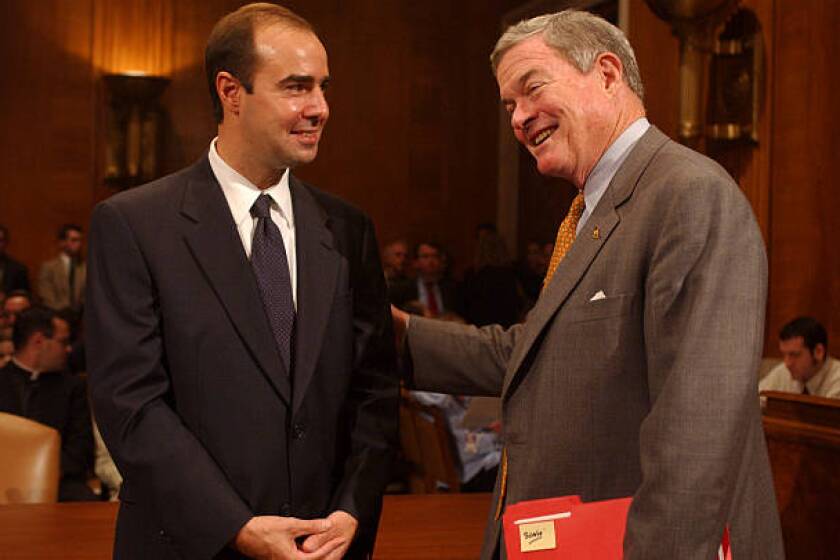Column: Warren proposes the largest expansion of worker rights ‘since the New Deal’

For years, Democratic politicians have been accused of showing indifference toward the interests of the working class, slighting a sector that had been part of their base since the 1930s.
Sen. Elizabeth Warren of Massachusetts on Thursday put forth a labor platform that would go far to restore the relationship, in part by reversing the hostility to workers shown by the Trump administration.
Warren describes her labor package as “the most progressive and comprehensive agenda for workers since the New Deal.” That’s a fair assessment, though incomplete.
Trump’s evisceration of labor protections will continue under Labor Department nominee Scalia
Her proposals would exceed the New Deal standard, in part because workers and organized labor have lost so much ground over the last eight decades, and because the modern labor landscape requires initiatives that weren’t contemplated in the ‘30s.
Among the more important structural features of the package are a pledge to remake the Supreme Court to declaw its emergent anti-labor majority. Warren pledges that as president she would nominate “a demonstrated advocate for workers” to fill any vacancy. Her proposals also take aim at major provisions of the egregiously anti-labor Taft-Hartley Act, which was passed in 1947 over President Truman’s veto.
Warren’s labor plan is sure to garner lots of discussion at the Service Employees International Union (SEIU) presidential forum opening Friday in Los Angeles. In addition to Warren, Democratic candidates Joe Biden, Julian Castro, Cory Booker, Beto O’Rourke, Kamala Harris and Bernie Sanders have previously committed to attend, though Sanders has been sidelined by heart surgery.
By strengthening the enforcement of labor protection, Warren’s proposals would reverse what I called the transformation of the Department of Labor into the Department of Employer Rights under Trump. She would also invest the National Labor Relations Board with a pro-labor outlook, which is desperately needed.
Alexander Acosta may bear the title of U.S.
Here are some of the key elements of Warren’s proposal:
--Extending organizing and workplace rights to more workers. Warren would bring farm and domestic workers under the shelter of the National Labor Relations Act and other workplace statutes. As she observes, in some cases the exclusions date back to the 1930s, when the Roosevelt administration bowed to the demands of big business and southern segregationist Democrats in order to get the NLRA passed.
Warren would clamp down on the misclassification of workers as “independent contractors,” a subterfuge that is addressed in California’s recently signed SB 5 “gig worker” law, which she supported.
She would codify a “joint employer” standard, which would ensure that big companies such as McDonald’s and Walmart can’t hide behind franchisees and subcontractors to evade their responsibilities to employees in stores and warehouses. A rule proposed by the Trump administration would sharply curtail the joint employer definition, limiting it to cases where the parent company has the right to hire and fire the employee and set wages, among other requirements.
--Guaranteeing the right to unionize. Warren would prohibit states from enacting “right to work” laws, which ban contracts requiring workers to pay the cost of union representation. These laws, which exist in 28 states, are a key tool by anti-labor forces for fighting unionization drives. A bill Warren introduced in 2017 would have preempted states from enacting or enforcing right-to-work laws. Warren would guarantee graduate students, home care workers and public sector workers the right to organize.
And she would crack down on anti-union “intimidation by state and local officials,” addressing recent cases in which those officials have injected themselves into organizing campaigns. Case in point: interference by Tennessee’s then-Gov. Bill Haslam in a United Auto Workers unionization drive at a Volkswagen plant in his state in 2014. Warren is a bit vague on how she would respond, beyond promising to “take every step possible to prevent federal resources from being used by state or local government to intimidate or coerce workers.”
Back in 2010, I had an emotional conversation with a woman I am proud to call my closest transgender friend.
Warren would eliminate restrictions on secondary boycotts in the Taft-Hartley Act and subsequent laws. These are union actions placing pressure on companies that do business with the targets of union disputes. And she would promote “sectoral bargaining.” That’s negotiating on behalf of workplace categories across numerous companies (think the “fight for $15” minimum wage for janitors or hotel housekeepers), rather than organizing company by company, the model of union activity since the 1950s. Sectoral bargaining is legal but restricted under current federal law.
--Raising wages. Warren supports raising the federal minimum wage to $15 from its current $7.25 via federal law. She says she would impose the higher minimum on federal contractors via executive order. She also would revive and expand the Obama administration proposal raising the salary threshold for workers eligible for overtime pay. Trump sharply cut back that proposal, depriving as many as 8.2 million workers of eligibility for better pay.
--Combating discrimination against LGBTQ workers. The Trump administration has shown marked hostility to these workers. In a case coming before the Supreme Court, the administration is arguing that federal anti-discrimination statutes don’t apply to discrimination based on sexual orientation or transgender status. Warren says she would bar federal contracts with any company lacking a nondiscrimination policy that “recognizes gender identity and sexual orientation as protected classes.”
More to Read
Inside the business of entertainment
The Wide Shot brings you news, analysis and insights on everything from streaming wars to production — and what it all means for the future.
You may occasionally receive promotional content from the Los Angeles Times.












